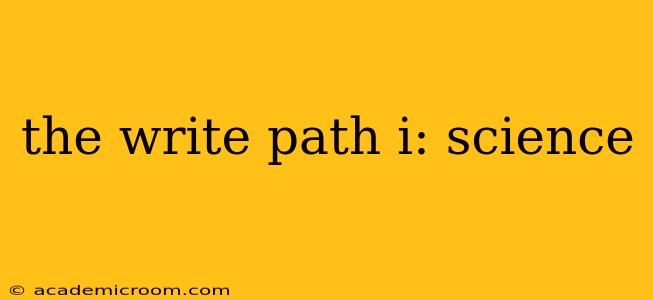Science communication is crucial. It bridges the gap between complex scientific discoveries and the public, fostering understanding, encouraging informed decision-making, and inspiring future generations of scientists. But crafting compelling science writing isn't just about relaying facts; it's about weaving a narrative that captivates and informs. This guide explores the essential elements of writing impactful science communication, helping you find your own write path.
What Makes Good Science Writing?
Good science writing goes beyond simply explaining scientific concepts. It requires clarity, accuracy, and engagement. The most effective science writing tells a story, using narrative techniques to draw the reader in and make complex information accessible. This involves:
- Clarity: Using precise language, avoiding jargon where possible, and explaining technical terms clearly.
- Accuracy: Ensuring factual correctness and avoiding misrepresentations or oversimplifications. Proper citation of sources is paramount.
- Engagement: Using vivid language, compelling examples, and a relatable narrative style to maintain reader interest.
- Context: Placing scientific findings within a broader context, highlighting their significance and implications.
How to Write a Science Article: Step-by-Step Guide
Crafting a successful science article involves a structured approach:
- Research: Thoroughly research your topic. Consult peer-reviewed journals, reputable websites, and relevant experts.
- Outline: Structure your article logically, with a clear introduction, body, and conclusion. Create subheadings to break down complex information.
- Write a Compelling Introduction: Hook your reader from the start. Start with an intriguing question, a surprising statistic, or a relatable anecdote.
- Develop Your Argument: Present your information clearly and concisely, supporting your claims with evidence and examples. Use visuals where appropriate (charts, graphs, images).
- Conclusion: Summarize your main points and highlight their significance. Consider offering a call to action, encouraging further research or discussion.
- Edit and Proofread: Thoroughly edit your work for clarity, accuracy, and style. Proofread carefully to eliminate any grammatical errors or typos.
Common Mistakes to Avoid in Science Writing
Several common pitfalls can hinder the impact of your science writing:
- Overuse of Jargon: Avoid technical terms without explanation. Define any specialized vocabulary clearly.
- Passive Voice: While sometimes appropriate, overuse of passive voice can make your writing sound dull and indirect. Favor active voice for clarity and impact.
- Lack of Visuals: Visual aids (charts, graphs, images) can greatly enhance understanding and engagement.
- Poor Organization: A well-structured article is crucial for clear communication. Use headings, subheadings, and bullet points to improve readability.
Finding Your Niche in Science Writing
The field of science communication is vast, offering diverse opportunities:
- Journalistic Science Writing: Reporting on scientific breakthroughs for the general public.
- Technical Writing: Creating manuals, instructions, and other documents for a specialized audience.
- Grant Writing: Preparing proposals to secure funding for scientific research.
- Science Blogging: Sharing scientific information and insights through online platforms.
H2: What are some examples of successful science writing?
Successful science writing engages the reader through clear explanations, relatable examples, and a compelling narrative. Examples include articles in publications like Science, Nature, and The Scientist, as well as popular science books such as those by Bill Bryson and Carl Sagan. These works successfully translate complex scientific information into accessible and engaging narratives.
H2: How can I improve my science writing skills?
Improving your science writing skills takes practice and dedication. Read widely, focusing on clear and engaging science writing. Seek feedback from others, and consider taking a science writing course or workshop. Practice consistently, experimenting with different writing styles and techniques.
H2: What resources are available for aspiring science writers?
Numerous resources are available to support aspiring science writers. Many universities and organizations offer workshops and courses in science writing. Online resources include writing guides, style manuals, and communities of science writers. Networking with other science writers can also provide valuable support and guidance.
By following these guidelines and consistently practicing, you can develop the skills necessary to craft compelling and impactful science writing, ultimately making the wonders of science accessible and engaging for all.
